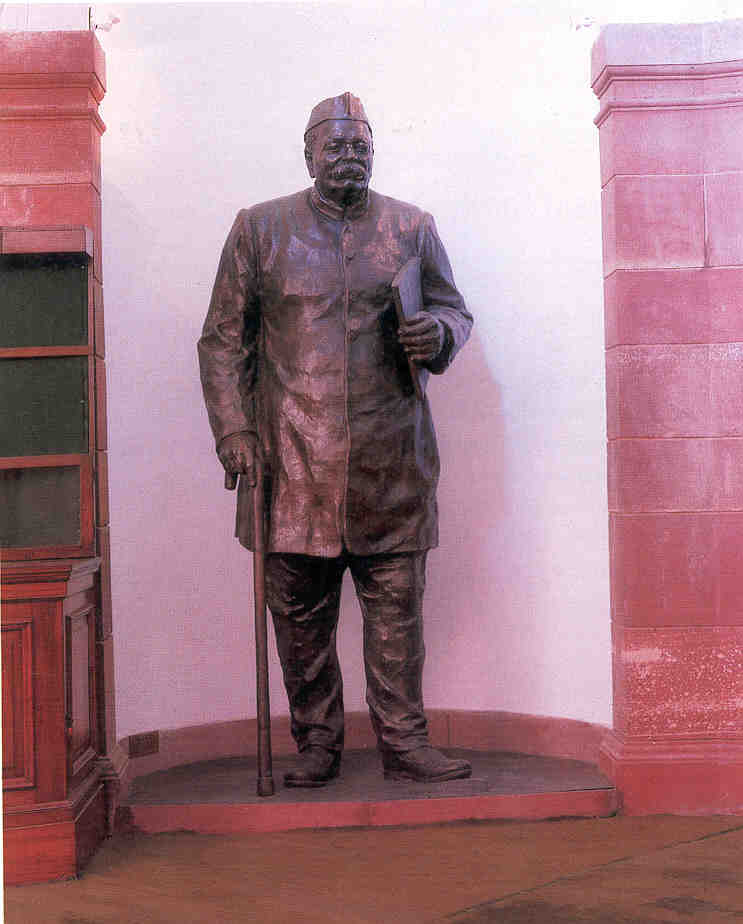 |
 |
|
|
 |
| Govind Ballabh Pant was
born on August 30, 1887 in Shyahi Devi hills in Almora. His mother's name
was Govindi. His father, Manorath Pant, was constantly on the road. Govind
was brought up by his grandfather, Bandri Dutt Joshi, who played a prominent
part in molding the youngster's views. Govind greatly respected his grandfather's
firm belief in honesty and tried to inculcate them into his own life.
As a child, Govind was mediocre. He loved playing "gilli danda" and football. He was always late to school. In fact he was never on time most of his young life. All of his interests were those of a layman and did not indicate the shrill and extraordinary individual that he was going to transform into. In later years of his school he showed a remarkable and impressive growth. He excelled in studies, especially Mathematics and was a leader amongst his classmates. After finishing school, Govind made plans to go to Allahabad to further his education but was discouraged by his relatives on account of Govind's delicate health. The incentive to obtain further education was far grater then his concern towards his health. He said farewell to his relatives and left for Laahabad in 1905. Govind enrolled at the Muir Centeral College where his ingenious and radiant personality was quickly recognized by his professors. He excelled in the fields of Mathematics, Literature and Politics. Even though his health continued to suffer throughout his College career, his avid ambition led him to attain a degree from one of the finest universities in India at the time. His first opportunity to support the Congress came in December 1905 when he served as a swayamsewak at the Congress session at Allahabad. He was greatly impressed by Gopalkrishna Gokhale and Madan Mohan Malaviya's views. Just two years later a kumbh mela took place where Govind, along with Hargovind Pant, a friend, worked as swayamsewaks. Here he made a thundering speech with a distinct nationalist color. The speech was reported to the college Principle, who as punishment, forbade Govind from taking the B.A. examination. Govind was stunned by the action. His main goal to come to Allahabad was to receive a degree and now that was in jeopardy. Pt. Mandan Mohan Malaviya threatened the principle with legal action. Finally the principle succumbed to pressure and allowed Govind to take the examination. Govind decided to study law in 1907, following his B.A. degree. In 1909 he was awarded the Lumsden award when he scored highest in the Bar examination. Govind Pant began to practice in Almora in 1910. Then he moved to Ranikhet and eventually to Kashipur, a flourishing and affluent city, in 1912. During his booming practice in Kashipur, he established an organization called Perm Sabha. The main focus of the organization was to integrate social and literary works of India. The Sabha stopped the British from shutting down one of the Kashipur schools by generating enough funds to pay the school taxes. A law at the time required the local people to carry the luggage of travelling British officials, without payment. The Parishad, under the guidance of Pant, demonstrated and successfully abolished the practice of coolie beggar. The Parishad also fought against illiteracy, hunger and for preservation of forests. Pant delved into politics
in December of 1921. Greatly impressed by Gandhiji's concept of a non-violent
freedom struggle, Pant devoted himself to the non-cooperation movement.
In 1925, a few freedom fighters stopped a train and looted government money near Lucknow. The British began to indiscriminantly arrest freedom fighters. Pant tried relentlessly to defend the arrested freedom fighters in court, but the administration had dictated their sentences well before the trial. Three of the men were convicted and hanged while others were given life sentences. Congress voted to boycott the Simon Commission on account of its all-white panel. The Commission landed in Lahore on October 11, 1928. In a demonstration Lala Lajpat Rai was struck down by lathis and Pant was severely injured (the physical impact would incapacitate him rest of his life) in a procession in Lucknow |
|
Pant was arrested for a period of seven months because he attended provincial Congress session in Uttar Pradesh when the Government banned it. Pant joined the U.P. Legislative Council in 1935 when the Government of India Act allowed a provincial government. In the U.P. ministry, Pant saw the problem of untouchability that had concerned Gandhiji for many years. Pant tried to reach the root of untouchability, which was in prevalence in remote areas where Gandhiji's preachings had not yet reached. Pant reformed many areas during his post. Education, labor's plight and farmers' fight against zamindars were some of the social reforms he focused on. While the world was submerged in the second World War, India saw a rift develop between the extremist and moderate wings of the Congress. The moderates supported Gandhiji in assisting the British Crown in the war efforts, and the other believed in Subash Chandra Bose's ideology of taking advantage of the situation and toppling the British Raj from India through all means possible. Pant was called to act as a peacemaker, and urged the Congress to support Gandhiji. In 1940 Pant was arrested on the charge of helping in the satyagraha movement and was sent to Almora prison. On launching "Quit India" resolution in 1942, all the prominent Indian leaders, including Pant, were arrested. Pant was sent to Ahmednagar Jail. From jail he wrote to his children and kept busy writing on political matters. Pant's health continued to deteriorate and finally Nehru had to plead for his release. Pant was released in March of 1945. After Independence, Pant was nominated Chief Minister of Uttar Pradesh. During his office, the state faced numerous problems; poverty, black-marketing and unemployment being some of them. The state witnessed many insurgent riots, following partition. Pant traveled to inflicted areas to calm the people. He abolished the zamindari system and worked on many other bills to help farmers. He saw that Harijans were treated fairly, and concentrated on developing the education, medical and industrial (mainly cottage) sectors. Upon the death of Sardar Patel, Nehru called on Pant to take the position of Home Minister. The most renowned work that he accomplished as Home Minister was to make Hindi the official language of India. In 1957, the Government of India honored Pant with the Bharat Ratna award. In 1960 Pant suffered a heart attack. In February of 1961, he fell ill while still in office and died on March 7, 1961 after slipping into a coma for several days.
|
| Back to Home |
|
||||
 |
 |
 |
 |
 |